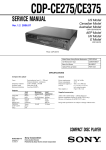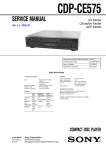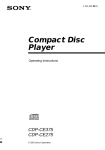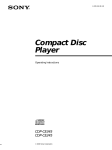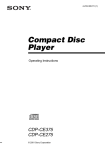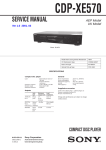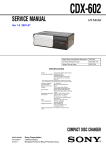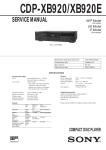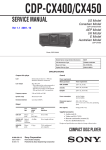Download Sony CDP-CE375 User's Manual
Transcript
CDP-CE275/CE375 SERVICE MANUAL US Model Canadian Model Australian Model Ver 1.1 2001.07 CDP-CE275/CE375 AEP Model UK Model E Model CDP-CE375 Photo: CDP-CE375 Model Name Using Similar Mechanism CDP-CE345 CD Mechanism Type CDM59-5BD27 Base Unit Name BU-5BD27 Optical Pick-up Name PXR-104X SPECIFICATIONS Compact disc player Laser Frequency response Dynamic range Harmonic distortion General Semiconductor laser ( λ = 780 nm) Emission duration : continuous 2 Hz to 20 kHz ± 0.5 dB More than 93 dB Less than 0.0045% Power requirements Power consumption Dimensions (approx.) (w/h/d) Mass (approx.) 120 V AC, 60 Hz 11 W 430 x 110 x 400 mm (17 x 4 3/8 x 15 3/4 in.) incl. projecting parts 5 kg (11 lbs 1 oz) Outputs ANALOG OUT DIGITAL OUT (OPTICAL) PHONES (CDP-CE375 only) Jack type Phono jacks Optical output connector Stereo phone jack Maximum output level 2V (at 50 kilohms) –18 dBm 10 mW Load impedance Over 10 kilohms Wave length: 660 nm 32 ohms Supplied accessories Audio cord (2 phono plugs – 2 phono plugs) (1) Remote commander (remote) (1) (CDP-CE375 only) R6 (size AA) batteries (2) (CDP-CE375 only) Design and specifications are subject to change without notice. COMPACT DISC PLAYER 9-873-822-12 Sony Corporation 2001G0500-1 C 2001.7 Home Audio Company Shinagawa Tec Service Manual Production Group CDP-CE275/CE375 Ver 1.1 2001.07 SECTION 4 TEST MODE ADJ MODE Connecting Location: NOTE: This mode cannot be performed without a general remote commander. – MAIN BOARD (Component Side) – 1. Chuck the CD first, and then turn OFF the power. 2. Short-circuit the test point TP1 (ADJ) of the MAIN board and ground with a lead wire. 3. Press the [POWER] button to turn ON the power. The CD is playback automatically and the ADJ mode is set. 4. To exit the mode, press the [POWER] button to turn OFF the power. • Prohibits high speed search during accessing • Ignores even if GFS becomes “L” ADJ Mode Special Function Table Button Function PLAY MODE Auto gain display (Focus, Tracking and Sledding) EDIT RFCK → GFS → Error rate display FLUORESCENT INDICATOR TUBE ALL LIT, AND KEY CHECK MODE 1. Short-circuit the test TP2 (AFADJ) of the MAIN board and ground with a lead wire. 2. Press the [POWER] button to turn ON the power. The whole fluorescent indicator tube lights up. 3. All buttons have individual button numbers. When a button is pressed, the button number is counted up and displayed. 1 Count up display 0 TP1 (ADJ) JW68 Displays button number When remote controller signals are received, “RM **” will be displayed. (** are the numbers corresponding to the remote controller buttons.) When using the remote controller, switch the [CD1/2/3] switch to CD1. 4. To exit the mode, press the [POWER] button to turn OFF the power. 10 JW66 TP2 (AFADJ) CN301 CDP-CE275/CE375 Ver 1.1 2001.07 Buttons and Corresponding Button Numbers Button DISC1 Button Number or Display 12 DISC2 11 DISC3 10 DISC4 9 DISC5 8 PLAY MODE 20 PEAK SEARCH 19 FADER 18 REPEAT 17 TIME 16 H (PLAY) Partial lighting 1 X (PAUSE) Partial lighting 2 x (STOP) All lit EX-CHANGE 35 DISC SKIP 36 m 24 M 25 EDIT 26 CHECK 27 CLEAR 28 AMS (push) AMS (turn) All lit ALL1DISCS REPEAT 1 EDIT TIME FADE A B PROGRAM SHUFFLE DISC TRACK PEAK MIN STEP SEC 1 2 3 4 6 7 8 9 10 5 11 12 13 14 15 16 17 18 19 20 Partial lighting 1 TRACK MIN SEC R Light altemately r ALL1DISCS DISC PEAK STEP 1 2 3 6 7 8 4 5 37 When rotated clockwise: The music calendar numerals light up in ascending order. When rotated counterclockwise: The music calendar numerals light up in descending order. Partial lighting 2 1 3 7 11 5 9 13 15 18 20 R Light altemately r 2 6 4 8 10 12 14 16 17 19 11 CDP-CE275/CE375 Ver 1.1 2001.07 AGING MODE For the aging mode, three modes of all mode, disc table mode, and loading mode are available. This set has the Aging mode for operation check of the mechanism deck. • If a failure occurred The aging operation stops and a faulty status is displayed on the fluorescent indicator tube. • If no failure occurs The aging operation continues repeatedly. Note: Do not use the test disc when performing aging. Aging will not be performed properly if discs with tracks shorter than 4 seconds are used. Procedure: 1. Press the [POWER] button and turn ON the power. 2. Set discs on all trays. (More than two discs if five are not available) 3. All mode: Press the [CHECK], [PLAY MODE] and x buttons at the same time. Disc table mode: Press the [CHECK], [PLAY MODE] and [SKIP] buttons at the same time. Loading mode: Press the [CHECK], [PLAY MODE] and [EX-CHANGE] buttons at the same time. 4. Aging starts, and the fluorescent indicator tube will display the following. 5. To exit the mode, press the [POWER] button to turn OFF the power. Code No. Status All mode Disc table mode Loading mode Display in Normal operation Display in case of failure a A-0 Err 0 a a A-1 Err 1 Err 2 0 CLOSE (Tray closed) a 1 TOC reading a 2 Access to last track a A-2 3 Play of last track (3 sec) a Counter display Err 3 4 EX OPEN (Tray opened while chucking) a A-4 Err 4 5 EX SKIP (Disc tray rotated) a A-5 Err 5 6 EX CLOSE (Tray closed) a 7 Access to first track a 8 Play of first track (3 sec) a 9 OPEN (tray opened) a A DISC SKIP (Disc tray rotated, and next disc was selected) a a a a a A-6 Err 6 A-7 Err 7 Counter display Err 8 A-9 Err 9 A-A Err A The discs are selectie in the order of DISC1 →DISC2 → DISC3 → DISC4 → DISC5 → DISC1 → .... Empty trays are skipped. But the order is random in the disc table mode. MECHANISM DECK CHECK MODE For the mechanism deck check mode, two modes of disc table mode and loading mode are available. In the mechanism deck check mode, the disc table turning time and the loading time in each section are measured and displayed. Procedure: Disc table mode: Press the [POWER] switch while pressing H , [A OPEN/CLOSE] and [REPEAT] buttons simultaneously. Loading mode: Press the [POWER] switch while pressing H , [A OPEN/CLOSE] and [TIME] buttons simultaneously. Display contents Mode Disc table mode ( Table turning time measurement ) Check command Display 0: Right one turn r 12.5 1: Left one Turn L 10.2 2: Measurement end r 12.5 3: Undefined Table mode ( 12 Loading time measurement ) 4: Star position Sta – –.– 5: Open → Close CLo 10.2 6: Close → BU up UP 0.7 7: BU up → EX open EoP 6.2 8: EX open → EX close ECL 10.3 9: EX close → BU down don 1.2 A: BU down → Open oPn 9.3 FF: Measurement end CLo 10.2 CDP-CE275/CE375 Ver 1.1 2001.07 SECTION 5 ELECTRICAL ADJUSTMENTS Note: 1. CD Block is basically designed to operate without adjustment. Therefore, check each item in order given. 2. Use PATD-012 disc (4-225-203-01) unless otherwise indicated. 3. Use an oscilloscope with more than 10MΩ impedance. 4. Clean the object lens by an applicator with neutral detergent when the signal level is low than specified value with the following checks. S Curve Check Connection: oscilloscope BD board TP (FE1) TP (VC) Procedure: 1. Set the test disc (PATD-012). Disc chucking operation is complete, then press the [POWER] button to turn the power off. 2. Connect an oscilloscope to test point TP (RFDC) and TP (VC) on the BD board. 3. Connect between test point TP (ADJ) on the MAIN board and GND by lead wire. 4. Press the [POWER] button to turn the power on and enter the ADJ mode, then playback the number two track automatically. 5. Confirm that oscilloscope waveform is clear and check the level of between RFDC top and VC is correct or not. Note: A clear RFDC signal waveform means that the shape “◊” can be clearly distinguished at the center of the waveform. + – RFDC signal waveform Procedure: 1. Set the test disc (PATD-012). Disc chucking operation is complete, then press the [POWER] button to turn the power off. 2. Connect an oscilloscope to test point TP (FE1) and TP (VC) on the BD board. 3. Connect between test point TP (ADJ) on the MAIN board and GND by lead wire. 4. Press the [POWER] button to turn the power on and enter the ADJ mode. Then playback the number two track automatically, press the x button to stop the playback. 5. Press the [CHECK] button actuate the focus search. (actuate the focus search when disc table is moving in and out) 6. Check the oscilloscope waveform (S-curve) is symmetrical between A and B. And confirm peak to peak level within 2 ± 1 Vp-p. level: 1.15 ± 0.35 Vp-p VC Checking Location: BD board RFAC Level Check Connection: oscilloscope BD board TP (RFAC) TP (VC) S-curve waveform VOLT/DIV: 200 mV TIME/DIV: 500 ns + – symmetry A within 2 ± 1 Vp-p B Note: • Try to measure several times to make sure than the ratio of A : B or B : A is more than 10 : 7. • Take sweep time as long as possible and light up the brightness to obtain best waveform. Checking Location: BD board Procedure: 1. Set the test disc (PATD-012). Disc chucking operation is complete, then press the [POWER] button to turn the power off. 2. Connect an oscilloscope to test point TP (RFAC) and TP (VC) on the BD board. 3. Connect between test point TP (ADJ) on the MAIN board and GND by lead wire. 4. Press the [POWER] button to turn the power on and enter the ADJ mode, then playback the number two track automatically. 5. Confirm that oscilloscope waveform is clear and check RFAC signal level is correct or not. Note: A clear RFAC signal waveform means that the shape “◊” can be clearly distinguished at the center of the waveform. RFDC Level Check Connection: oscilloscope RFAC signal waveform BD board TP (RFDC) TP (VC) VOLT/DIV: 200 mV TIME/DIV: 500 ns + – level: 1.35 ± 0.4 Vp-p Checking Location: BD board 13 CDP-CE275/CE375 Ver 1.1 2001.07 E-F Balance Check Connection: Checking Location: – BD BOARD (Conductor Side) – oscilloscope BD board TP (TE1) TP (VC) + – Procedure: 1. Set the test disc (PATD-012). Disc chucking operation is complete, then press the [POWER] button to turn the power off. 2. Connect an oscilloscpe to test point TP (TE1) and TP (VC) on the BD board. 3. Connect between test point TP (ADJ) on the MAIN board and GND by lead wire. 4. Press the [POWER] button to turn the power on and enter the ADJ mode, then playback the number two track automatically. 5. Press the [TIME] button. (The tracking servo and the sledding servo are turned OFF) 6. Check the level B of the oscilliscope waveform and the A (DC voltage) of the center of the Traverse waveform. Confirm the following : A/B x 100 = less than ± 22% Traverse Waveform Center of the waveform B A (DC voltage) 0V level: 1.15 ± 0.5 Vp-p Press the [TIME] button. (The tracking servo and sledding servo are turned ON) Confirm the C (DC voltage) is almost equal to the A (DC voltage) is step 6. 7. Traverse Waveform C (DC voltage) 0V Tracking servo Sled servo OFF Checking Location: BD board 14 Tracking servo Sled servo ON IC150 TP (VC) IC131 TP (FE1) IC101 TP (TE1) TP (RFDC) TP (RFAC) CDP-CE275/CE375 SECTION 6 DIAGRAMS 6-1. • Circuit Boards Location NOTE FOR PRINTED WIRING BOARDS AND SCHEMATIC DIAGRAMS Note on Printed Wiring Board: • X : parts extracted from the component side. • Y : parts extracted from the conductor side. • : Pattern from the side which enables seeing. (The other layers' patterns are not indicated.) Caution: Pattern face side: (Conductor Side) Parts face side: (Component Side) Parts on the pattern face side seen from the pattern face are indicated. Parts on the parts face side seen from the parts face are indicated. • Indication of transistor Q B C E These are omitted. Q B C E These are omitted. Note on Schematic Diagram: • All capacitors are in µF unless otherwise noted. pF: µµF 50 WV or less are not indicated except for electrolytics and tantalums. • All resistors are in Ω and 1/4 W or less unless otherwise specified. f : internal component. • • C : panel designation. Note: The components identified by mark 0 or dotted line with mark 0 are critical for safety. Replace only with part number specified. SENSOR board LOADING MOTOR board BD board POWER SW board Note: Les composants identifiés par une marque 0 sont critiques pour la sécurité. Ne les remplacer que par une pièce por tant le numéro spécifié. • Voltages and waveforms are dc with respect to ground under no-signal conditions. no mark : CD PLAY • Voltages are taken with a VOM (Input impedance 10 MΩ). Voltage variations may be noted due to normal production tolerances. • Waveforms are taken with a oscilloscope. Voltage variations may be noted due to normal production tolerances. • Circled numbers refer to waveforms. • Signal path. J : CD PLAY c : DIGITAL OUT • A: B+ Line • B: B– Line JUNCTION board KEY board MAIN board DISPLAY board HEADPHONE board 15 15 CDP-CE275/CE375 Ver 1.1 2001.07 6-3. SCHEMATIC DIAGRAM – BD Board – • See page 24 for Waveforms. • See page 24 for IC Block Diagrams. TP (RFAC) IC BD TP (RFDC) TP (TE1) TP (VC) TP (FE1) TP (SE1) IC BD (Page 21) The components identified by mark 0 or dotted line with mark 0 are critical for safety. Replace only with part number specified. 17 17 Les composants identifiés par une marque 0 sont critiques pour la sécurité. Ne les remplacer que par une pièce portant le numéro spécifié. CDP-CE275/CE375 6-5. SCHEMATIC DIAGRAM – JUNCTION/SENSOR/LOADING MOTOR Boards – • See page 25 for IC Block Diagram. TO MAIN BOARD (Page 21) IC BD 19 19 CDP-CE275/CE375 6-7. SCHEMATIC DIAGRAM – MAIN Board – • See page 24 for Waveform. (Page 23) (Page 17) (Page 23) (Page 23) (Page 19) The components identified by mark 0 or dotted line with mark 0 are critical for safety. Replace only with part number specified. 21 21 Les composants identifiés par une marque 0 sont critiques pour la sécurité. Ne les remplacer que par une pièce portant le numéro spécifié. CDP-CE275/CE375 6-9. SCHEMATIC DIAGRAM – PANEL Section – (Page 21) (Page 21) (Page 21) The components identified by mark 0 or dotted line with mark 0 are critical for safety. Replace only with part number specified. Les composants identifiés par une marque 0 sont critiques pour la sécurité. Ne les remplacer que par une pièce portant le numéro spécifié. 23 23











